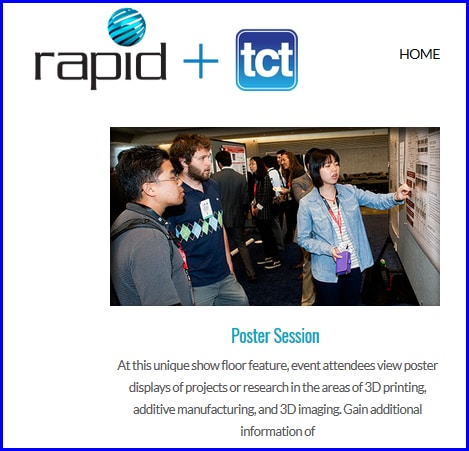Each year, the nation’s largest 3D printing event, RAPID + TCT, provides an opportunity for students with its Poster Challenge. The goal of the challenge is to foster student interest in additive manufacturing (AM) and provide the AM engineering community with fresh perspectives and innovative ideas.
The poster competition also creates a forum where attendees can share ideas with peers, gain visibility as a subject-matter expert, and particularly for students, to establish relationships within the industry as they start preparing for their future career.
There is a dedicated exhibits area at this year’s show in Detroit, Michigan (see our tips for getting the most of out of the RAPID + TCT event) where posters will be displayed on Tuesday and Wednesday; open to all event attendees. On Wednesday, May 22, a special Interactive Poster Session is scheduled where the poster presenters (students) will present their work to the judges, interact with guests, answer questions, and discuss the technology/features of their display.
TEAMM Network member, Tennessee Tech University (TTU) Engineering students (Dr. Ismail Fidan’s team) submitted two poster abstracts and both were accepted this year:
- Universal Bottle Cap Opener design and 3d-printing
- Thermomechanical analysis of short-fiber reinforced additively-manufactured components
Students are actively working on their poster presentations. This is Dr. Fidan’s team’s first time submitting posters and are learning that the competition pool is large. Still, it is an honor to be accepted and to be in the running for one of SME’s prizes.
Students must provide a description of the design along with supporting figures and photographs. Poster presentations will be judged on several factors, including:
- Creativity
- Integrity of analysis
- Impact on manufacturing cost, quality or performance requirements
- Quality of the presentation (timeliness, graphics, clarity, spelling and grammar)
- Poster display — visual representation
Poster abstracts represent research, case studies and/or applications in any of the following areas:
- 3D imaging & scanning/CT scanning
- Additive manufacturing applications
- Additive manufacturing design considerations
- Application of AM to the aerospace, automotive, consumer products, medical industry, among others
- Sustainability of AM
- Applied academic research
- Direct-Write printed materials and electronics
- Engineering Education, Outreach, and workforce development
- Hybrid systems applications
- Material development and characterization
- New and emerging additive manufacturing processes
- Post processing
- Software modeling/Digital thread
The competition is open to registered students in their junior or senior year of their undergraduate program or graduate-level degree engineering programs. Although this year’s deadline has passed, students and professors can learn more about the Poster Challenge here.
Poster Challenge Prizes & Awards
The posters will be judged and there will be first runner-up, second runner-up and overall winner. Cash prizes and awards, listed below (subject to the quality of the entries), will be presented onstage at RAPID + TCT prior to the keynotes. Two first prize and two second prize winners will be selected from undergraduate and graduate students.
- First Prize – $750; Second Prize – $500, Third Prize – $250 (Awardees must be present at the Awards Ceremony on Thursday to accept the prizes)
- First prize and second prize plaques
- A certificate of achievement
- A complimentary, one-year SME membership
- A recognition letter sent to the winners with a copy sent to the university advisor/educator
- Recognition letter to a student newspaper/technical publication designated by winners
If you are a professional, moving along in your career, make a point of stopping by the Poster Challenge section and meeting some of these ambitious young women and men to help them on their networking and career journey. The AM industry is growing, but still a niche within the larger manufacturing world and one where we can support and encourage our younger peers.
